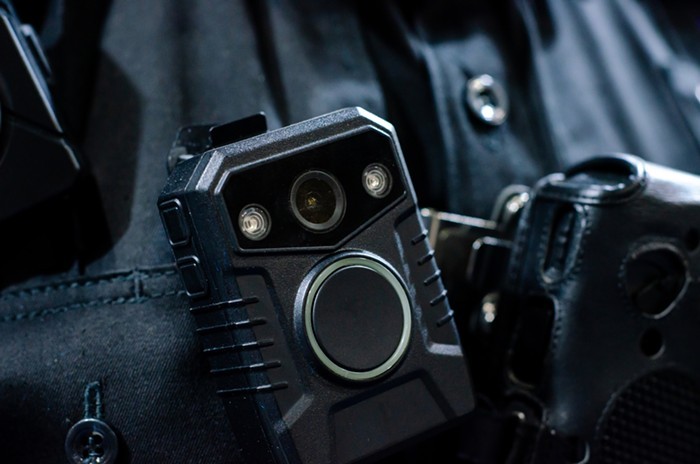After over 18 months of negotiation, the City of Portland and police union are unable to agree on whether officers should be able to review footage from body cameras before writing an incident report. After declaring an impasse earlier this week, the city and the Portland Police Association (PPA), the union representing rank-and-file officers, will now rely on a third-party arbitrator to make a final policy decision.
Portland has considered using body cameras since 2014 when the technology was recommended by a federal judge overseeing Portland’s settlement agreement with the US Department of Justice (DOJ), which seeks to address Portland police officers’ pattern of using disproportionate force against people with a mental illness. Concerns with funding, public opposition, and the uncertainty of the COVID-19 pandemic delayed body camera conversations until 2021, when the DOJ determined the Portland Police Bureau (PPB) must begin using body cameras as part of the ongoing settlement agreement. The city has $2.6 million set aside to purchase cameras and run a pilot program, but disagreements on the details of the pilot program between the city and PPA have continued to delay outfitting Portland officers with body-worn cameras. Portland is one of the last major cities in the US to not utilize body cameras.
According to proposed body camera policies released Friday, the city and PPA agree on most of the conditions surrounding the use of the cameras. Portland leaders and the police union agree that all sworn officers must wear the cameras unless they are undercover, the cameras will be automatically turned on via Bluetooth when officers activate their emergency lights or draw their weapon from their holster, and officers will manually turn on their camera when conducting a traffic stop, responding to a call, or conducting a search.
The disagreement revolves around when officers can review footage that their body cameras recorded, particularly after they have used force against a member of the public.
The PPA argues that officers should be able to review their camera footage prior to giving a statement or writing a report in order to give the most accurate account of the incident.
“The PPA is a strong proponent of achieving best practice, and our position reflects that,” said PPA President Aaron Schmautz in a press release Friday. “In fact, utilizing available evidence, including video, to complete comprehensive reports is consistent with every major agency in the State of Oregon with body cameras, as well as the vast majority of national agencies.”
The city of Portland, however, argues that the police should not be able to review their body camera footage before being interviewed or writing a report about a use of force incident. While the city did not elaborate on its position, supporters of restricted review policies argue that an officer’s account of a use of force incident—untainted by reviewing video footage—is critical to understanding why the officer chose to use force.
Dan Handelman of Portland Copwatch, a police accountability advocacy organization, argues that an officer’s memory of an incident is central in use of force investigations due to the legal precedent in Graham v. Connor, a US Supreme Court ruling that determined the reasonableness of a police officer’s use of force must be determined based on the conditions the officer knew on the scene, not in 20/20 hindsight.
“When they say you can't base it on 20/20 hindsight, that means the officer can't go back and look at photos or video of the scene and decide whether or not what they did was appropriate based on what they saw,” Handelman told the Mercury. “They have to say what they thought and tell their story or write down a report, and then they can look at the video.”
Despite that ruling, the majority of the largest cities’ police departments around the country allow officers to review footage before giving a statement.
While the city and PPA have spent over a year negotiating policies, the final policy may ultimately be up to the DOJ. Because the body-worn camera pilot is a condition of the city’s settlement with the DOJ, the Feds have final say on whether the policy conditions agreed to by the city and PPA are suitable. Notably, US attorney Jared Hager has already indicated that the DOJ is not supportive of allowing the police to review body camera footage before officers are interviewed or write a report.
“We believe that any use of force report should be written before officers review their body worn camera footage, in order to ensure that we have an accurate captioning of an important piece of evidence that the body worn camera is not going to capture and that is: ‘Why did the officer use force? What was in the officer's mind the moment before they used force against a civilian?’” Hager said in a 2022 community listening session. “That evidence can only be captured if an officer writes a report before viewing the footage because otherwise their memory gets tainted by what they see on camera.”
Arbitration could take several months to conclude, further delaying the pilot body camera program. The proposed timing of the body-worn camera pilot program may become more clear during the upcoming settlement hearing check-in on February 28.



















